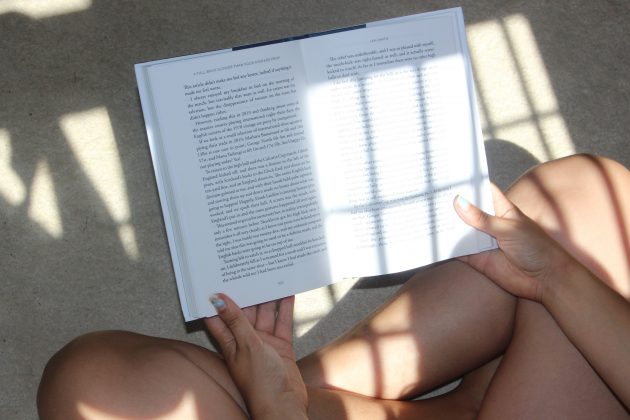The shortlists for the Telegraph Sports Book Awards are out. Rugby World looks at the six titles vying for the Rugby Book of the Year award that gets announced in mid July
The contenders for Rugby Book of the Year
Launched in 2003, the annual Telegraph Sports Book Awards showcase the cream of sports writing and publishing. The Rugby Book of the Year category came on board in 2008 and is judged by a panel of journalists from the Rugby Union Writers’ Club. Last year’s rugby winner, Ben Ryan’s Sevens Heaven, also picked up the Sports Book of the Year prize.
There’s a strong Welsh flavour to this year’s rugby shortlist, which is selected from books published in the 2019 calendar year. Besides the six books below, Kieran Read’s Straight 8 is a nominee for the Pinsent Masons International Autobiography of the Year.
Sadly, the pandemic has put paid to the summer awards dinner at Lord’s. So for the first time this year’s results will be announced online, on 15 July. We sum up the contenders for the Rugby Book of the Year, listed in alphabetical order…
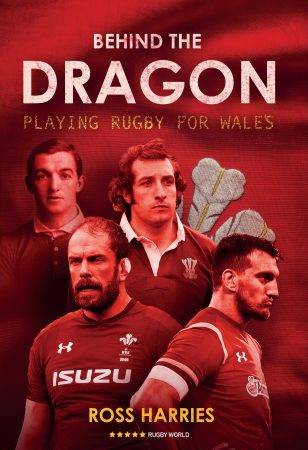
Behind the Dragon by Ross Harries, published by Polaris, RRP £20
Those familiar with this series – a country’s history told in the players’ own words – will be licking their lips. It’s a fail-safe formula, particularly when placed in the hands of Ross Harries, as accomplished a writer as he is a TV frontman.
The book charts the history of the Wales team from their debut thrashing by England in 1881 to the glory of their 2019 Grand Slam. In each chapter, Harries sets the scene before unleashing the first-person views of prominent figures of the era. Only one player, from the current set-up, declined to participate.
The shabby treatment of Welsh internationals during the amateur era is a strong theme. Whether it was a tight-fisted response to an expense claim or a nonsensical team selection, the WRU’s failings are exposed time and again.
I'm chuffed to bits that "Behind the Dragon" has been shortlisted for the Telegraph Rugby Book of the Year. It's in a pool of death with Gatland, Jones, and @samwarburton_ among the competition. I may need a Lloyd Williams crossfield kick to prevail in this one… https://t.co/WbozDQc2V4 pic.twitter.com/cgykPH0zL9
— Ross Harries (@rossharries1) June 17, 2020
From the sensational Seventies, in which Phil Bennett and JJ Williams are particularly vocal, we pass to the chaos of the Eighties and a gobsmacking tour to the Pacific Islands. The chapter heading? I’m going to die in Tonga.
Hilarious tales, scathing criticism and shocking revelations sit side by side in a book that will appeal to all. You don’t have to be Welsh to lap this up.
Click here to buy Behind the Dragon.

Brothers in Arms by David Beresford, self-published, RRP £40
Could we see the first self-published rugby winner? Englishman David Beresford is a Francophile and epicurean who spent 18 months tracking down and interviewing France’s golden generation of the 1980s. Les Bleus won or shared six Five Nations titles during the decade, including two Grand Slams.
Beresford’s fluency in the language opened doors that might otherwise have stayed firmly shut to a rosbif and the result is a fascinating insight into such legendary names as Sella, Blanco, Rives and Rodriguez.
In each case, Beresford, a former centre who played a good deal of rugby in France, dines with his subject and indulges in his passion for fine food and wine.
Pascals Ondarts, whose Hotel Loreak near Bayonne was the unofficial HQ for the project, proved an invaluable facilitator. Beresford’s diligence and determination did the rest and his list of interviewees includes relatives of those who departed life tragically young.
Thus, he meets Robert Paparemborde’s widow, Jacques Fouroux’s son, Armand Vaquerin’s brother and Pierre Lacans’s mother, and there is even a convivial beer with Marc Cécillon, who infamously shot his wife in 2004 and spent seven years in prison.
The success of the book stems from the warmth and originality of the content, stunning photography and, at times, an unexpected poignancy as the author shares experiences from his own life. Any profits from the book will be split between four charities.
Click here to buy Brothers in Arms.
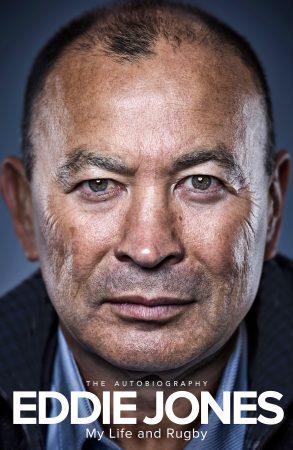
Eddie Jones: My Life and Rugby, published by Macmillan, RRP £20
As we pointed out, the judges for this award are all members of the Rugby Union Writers’ Club. Given the venom with which Eddie Jones lays into the English media in his autobiography, they must be a magnanimous lot.
The book, a collaboration with award-winning writer Donald McRae, has sold in big numbers and it’s easy to see why. The England head coach offers chapter and verse on a remarkable career that includes reaching a World Cup final with three different countries.
Encountering prejudice early in life, Jones used sport as a ticket to inclusion and, as a Ranwick player in the Ella era and later coach of the innovative Brumbies, was party to some of the most thrilling rugby ever seen.
The Australian missed out on a Wallaby cap as he was deemed to be too small. It seems he’s channelled that frustration into every action since. The lessons he’s acquired – from success and failure – have shaped his behaviour moving forward and are explained beautifully.
Jones has commented on making the Rugby Book of the Year shortlist. “I’m so pleased that our book has been nominated,” he said. “I’d like to wish all the other books in the shortlist the best. Whoever wins, I’m sure it will be a just result.” Such a polite young man.
Click here to buy My Life and Rugby.
RUGBY BOOK OF THE YEAR WINNERS
2008 Ripley’s World – Andy Ripley (Mainstream)
2009 Seeing Red: Twelve Tumultuous Years in Welsh Rugby – Alun Carter and Nick Bishop (Mainstream)
2010 Confessions of a Rugby Mercenary – John Daniell (Ebury Press)
2011 The Grudge – Tom English (Yellow Jersey)
2012 Higgy – Alastair Hignell (Bloomsbury)
2013 The Final Whistle: The Great War in Fifteen Players – Stephen Cooper (History Press)
2014 City Centre – Simon Halliday (Matador)
2015 Beyond The Horizon – Richard Parks (Sphere)
2016 No Borders: Playing Rugby for Ireland – Tom English (Arena Sport)
2017 The Battle – Paul O’Connell (Penguin Ireland)
2018 Wrecking Ball – Billy Vunipola (Headline)
2019 Sevens Heaven – Ben Ryan (Weidenfeld & Nicolson)
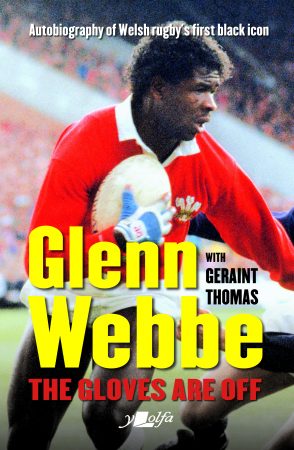
Glenn Webbe: The Gloves Are Off, published by Y Lolfa, RRP £9.99
An autobiography as punchy as its title. And typical of Welsh publishers Y Lolfa, who have made it onto many a rugby shortlist without yet landing the big prize.
A child of Windrush Generation parents, Eighties wing Webbe became the first black rugby player to represent Wales. His ten-cap Test career, spanning two-and-a-half years and yielding four tries, fails to convey his true impact.
Growing up in a rough part of Cardiff, Webbe needed a strong personality to go with his muscular physique. And he had it in spades – it takes guts to wear red, green and blue girls’ platform shoes to school!
His book is packed with the breezy fun that derives from a rugby environment, with Mark Ring an eager ally to his games and pranks. If you want to know about shaved eyebrows, bar brawls or Sticky Vicky the stripper, this is the read for you.
Yet Webbe also tackles a host of serious issues: racism, mental health, concussion and cancer, the latter a reference to the Hodgkin’s lymphoma he incurred after retiring.
Written in tandem with Geraint Thomas, The Gloves Are Off is the sort of book you might finish in a day – and then regret you’ve read it so quickly.
Click here to buy The Gloves Are Off.
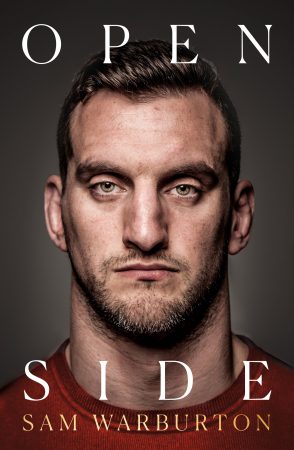
Sam Warburton: Open Side, published by HarperCollins, RRP £20
It’s two years since Warburton surrendered to the remorseless cycle of playing, injury and rehab that elite rugby can engender. Arguably, Open Side conveys that physical and mental toll better than any other rugby autobiography ever published.
Certainly, after more than 20 significant injuries or other setbacks, it’s easy to understand why he decided to quit at the age of 29.
Paradoxically, Warburton reveals both his human frailties – crying, being sick, wanting to flee from stress – and the courage that earned him so much respect as a flanker and captain.
Thanks @sportsbookaward for nominating ‘Openside’ for Rugby Book of the Year, in association with the Rugby Writers ? #ReadingForSport #SBA20 pic.twitter.com/SIvnnC01Ta
— Sam Warburton (@samwarburton_) June 17, 2020
When he tore a hamstring during a 2013 Lions Test, he played on in agony rather than leave the defensive line vulnerable. And on the next Lions tour, he effectively ‘deselected’ himself from the first Test by being honest about his form in a chat with Warren Gatland. Many others would not be so selfless.
On his shock sending-off at the 2011 World Cup, he admits he lied every time he told journalists that he agreed with referee Alain Rolland’s decision. “Actually I don’t. I think it should have been yellow. Other incidents in that tournament which were much worse than mine didn’t lead to red cards.” Most people see it exactly the same way, Sam.
Now part of Wayne Pivac‘s Wales coaching team, Warburton provides a heap of advice about leadership and suggests welfare measures to enhance the game. This collaboration with ghostwriter Boris Starling should be on everyone’s reading list.
Click here to buy Open Side.

Warren Gatland: Pride and Passion, published by Headline, RRP £20
The awards organisers have enjoyed revving up a new instalment of the Gatland-Jones rivalry – and why not. There are numerous parallels between the two superstar coaches: former hookers agonizingly denied a Test cap, teaching careers, a disdain for committee-room dinosaurs and acidic media men.
When Gatland wanted a £5,000 scrum machine for the Ireland team, he had to make two presentations and was immersed in “negotiations more long-winded than Brexit”. A short while later, he discovered the IRFU committee, ex-presidents and wives had splurged £150,000 on a weekend’s accommodation in Rome!
The New Zealander, who achieved undreamt-of success with Wales, Wasps and Waikato, has teamed up with Chris Hewett for his autobiography and what a cracker it is.
His initiative, man-management skills and blue-sky thinking shine through; so too the sensitivity that soured his Lions experiences as he was criticised over selection (2013) and disrespectfully lampooned as a clown (2017).
Gatland says he can’t recall his father ever hugging him or telling him he loved him. “When I was blessed with my own children, I hugged and kissed them every day they were growing up. I still do it now.”
He turned down the England job in 2006, claiming he didn’t want to be responsible for putting staff out of work. You know that would have bothered him. But you sense too he relishes the underdog tag, trying to bloody the nose of a bigger and better-resourced rival.
Click here to buy Pride and Passion.
Follow Rugby World on Facebook, Twitter and Instagram.





